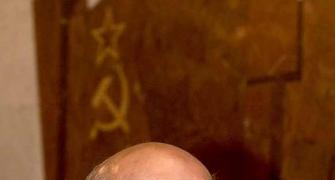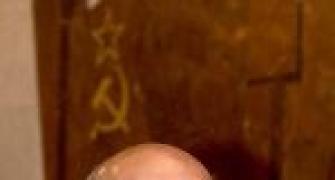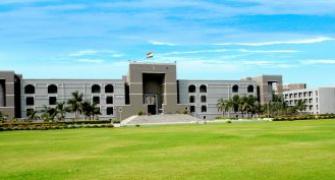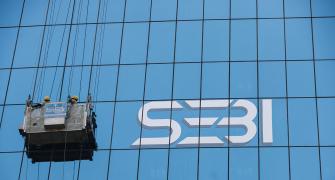 Senior analyst B Raman assesses Brajesh Mishra's role as India's first National Security Advisor, his part in the 1998 nuclear tests, the Kargil conflict and more.
Senior analyst B Raman assesses Brajesh Mishra's role as India's first National Security Advisor, his part in the 1998 nuclear tests, the Kargil conflict and more.
Brajesh Mishra, who was the National Security Adviser to former Prime Minister Atal Bihari Vajpayee between November 1998 and May 2004, passed away on Friday night. He was 84 and belonged to the 1951 batch of the Indian Foreign Service.
He became famous in May 1970 when he was heading the Indian embassy in Beijing as the Charge d'Affaires. At the traditional May Day function at Beijing, Chinese Communist leader Mao Zedong shook hands with Mishra, conveyed his greetings to our PM and President in that order and said, "We cannot go on quarrelling like this. We must become friends again. We will become friends again."
Mishra sent a detailed report on it to the Ministry of External Affairs. A few days later, an account of Mao's friendly references to India, which came almost eight years after the Sino-Indian war of 1962, leaked out to the Indian media which added some masala to it while flashing it, saying that Mao smiled at Mishra when he made his observations. This was followed by feverish speculation regarding the significance of Mao's smile.
The truth was Mao never smiled at Mishra when he made his observations, but "Mao's famous smile" and its significance became an exciting narrative in the history of India's relations with China and the role of Mishra in it. An authentic account of what happened that day in Beijing was written on December 2, 2009, for the website of the Chennai Centre For China Studies by G S Iyer, who was then the only Chinese-knowing member of the staff of the Indian embassy in Beijing. He subsequently became India's ambassador to Morocco and Mexico before retiring from the Indian Foreign Service.
Mishra again hit the headlines in the beginning of 1980. But under a different context. He had been posted as India's permanent representative to the United Nations in New York by the Morarji Desai government. He was occupying that post when the Soviet troops invaded Afghanistan.
There were reports that the Charan Singh government, which was then in office, had misgivings about the Soviet invasion and was disinclined to support the Soviet action.
Indira Gandhi, who returned to office as the PM in January 1980, had Narasimha Rao sent to New York to support the Soviet action. Mishra read out before the UN General Assembly a prepared text not disapproving of the Soviet invasion.
During in his retirement days, Mishra was reported to have told his close friends that he read out the statement on orders, but was not in agreement with its text.
Shortly thereafter, he took premature retirement from the Indian Foreign Service and joined the staff of the UN Secretary-General. He left the job and returned to India in 1987 and joined the Bharatiya Janata Party in 1991 to help it establish a foreign affairs cell in its headquarters. In that capacity, he used to advise BJP leaders on foreign policy matters and assist them during their meetings with foreign dignitaries.
Mishra and Vajpayee came close to each other during this period and Vajpayee developed immense trust in Mishra's judgement and advice. When Vajpayee took over as the prime minister in March 1998, he appointed Mishra as the principal secretary. In that capacity, he headed the Prime Minister's Office and co-ordinated its functioning.
Mishra played an important role in the deliberations that preceded the decision of Vajpayee to authorise India's nuclear tests of May 1998. The credit for maintaining the secrecy of the decision and of the preparations for the tests should go to the political leaders of the BJP, who were involved in the decision, Mishra who supervised the execution of the decision and Dr Abdul Kalam and his scientists who carried it out.
The Central Intelligence Agency was totally taken by surprise by the tests, which led to considerable friction in India's relations with the United States and China.
Mishra committed a major faux pas while drafting a letter from Vajpayee to then US President Bill Clinton explaining why India carried out the tests. The letter referred to India's fears of a possible threat from China as a reason for the decision. The US State Department mischievously leaked that letter to the US media, thereby adding to the friction between India and China.
It spoke well of the diplomatic skills of Mishra and the pragmatism of Beijing that they did not allow this aggravation of friction to permanently damage the bilateral relations.
Shortly after the nuclear tests, Vajpayee, on the recommendation of a three-member committee on national security headed by K C Pant, decided to revamp the national security infrastructure. As part of this revamp, a post of the National Security Adviser was created. The National Security Council created by V P Singh, which had become dormant, was revived and a National Security Council Secretariat and a National Security Advisory Board of non-governmental advisers were set up.
Vajpayee asked Mishra to hold additional charge as the NSA. Thus, he wore two hats -- as the principal secretary to the PM and as his NSA.
K Subramanyam, the strategic affairs expert, was appointed the first convenor of the NSAB. Even at that time, questions were raised by some regarding the wisdom of one individual, however capable, wearing both these hats. It was reported that the Pant Committee was in favour of an independent NSA.
So was K Subramanyam, who, on two occasions, had publicly expressed his misgivings about combining the two posts of the principal secretary to the PM and NSA. He felt that as the principal secretary, Mishra would be so preoccupied with running the PMO that he would not be able to devote adequate attention to his job as the NSA.
Mishra strongly felt that if the same officer held both the posts, he could prevent conflicting advice on national security matters reaching the PM.
During this period, I had written a number of articles stressing the need for the revival of the covert action capability of the R&AW that had been downgraded by I K Gujral when he was the prime minister in 1997. Mishra, who had read these articles, sent word to me through his office that I should call on him during one of my visits to New Delhi.
I did so in 1999. He referred to what I had been writing on the need for the revival of the covert action capability and said, " You don't have to convince me. I was convinced long before you were, but the prime minister is not in favour of it. We have to go by his wishes."
Subsequently, I had occasion to meet him three times. The first occasion was alone in his office. On his own, he referred to criticisms being made about Vajpayee's decision to ask him to hold additional charge as the NSA and said, "I do not want any confusion in the advice reaching the PM on national security matters. It is better that all advice on national security goes to the PM from this office."
He was sitting in his office as the principal secretary to the PM.
My next meeting with him was as a member of the special task force for the revamp of the intelligence apparatus headed by G C Saxena, former chief of the Research and Analysis Wing and the then governor of Jammu and Kashmir. He was asked by one of the members about his views regarding the performance of the Intelligence Bureau and the R&AW.
19.He replied, "I do not see all the reports of the IB. Hence, I cannot comment on its performance. I see all the reports of the R&AW, which works directly under me. When I was in the IFS, I used to think negatively of the R&AW. Now I think positively of it. I am regularly seeing its work and capabilities. It has been doing very well."
His remarks were an indirect confirmation of the speculation then circulating in New Delhi that L K Advani, the then home minister, had kept him out of any active role in supervising the performance of the IB.
My fourth meeting with him was just before the elections of 2004. There was some criticism in sections of the media about his role as the NSA. It was alleged that he had not implemented many of the important recommendations made by the various task forces on national security set up by the Vajpayee government after the Kargil conflict of 1999.
He had invited some of us for a briefing on the recommendations that had already been implemented. The briefing was given by the National Security Council Secretariat. He wanted us in our individual capacities to explain to the media and others regarding the action already taken by the government.
Some of the recommendations of the G C Saxena Task Force had related to the state police and the coordination between the central intelligence agencies and the state police. Sections of the media were speculating regarding these recommendations. Some state police officers had contacted me and said that the Government of India had not kept the state governments in the picture regarding these recommendations. I mentioned this to Mishra at this meeting.
Mishra replied, " Raman, you don't know what problems I have been having sorting out the quarrels among the central agencies regarding the implementation. Let me sort them out first. I will then sort out the recommendations relating to the state police."
I consider the brilliant manner in which Mishra handled the diplomatic consequences of the nuclear tests as his greatest achievement as the NSA. The Clinton administration was very petulant. China was furious. The European Union was not very sympathetic. Only Russia was sympathetic. Many of us feared that India would be confined to the diplomatic doghouse.
The fact that India was not and that our relations with these countries again improved spoke very highly of the way Mishra handled the sequel. He also saw to it that a nuclear doctrine was drafted, approved and put in place within a year of the tests.
He travelled a lot in this connection as a secret emissary of Vajpayee and I was given to understand that the R&AW played an important role in assisting him through its web of liaison relations with the countries, which were angry with India over the nuclear tests.
I had personally heard Mishra pay high tributes to the assistance from the R&AW in this regard.
He handled very creditably the sequel to the Kargil conflict with Pakistan and the sequel to the attack on the Indian Parliament. However, there was some criticism -- not invalid in my view -- of what was seen by many as his mishandling of the Kandahar hijacking and the case of Major Rabinder Singh, the CIA's mole in the R&AW, who managed to escape to the US in 2004.
He was allegedly totally unaware of the details of the crisis management drill to deal with hijackings that had been laid down in the 1980s when Indira Gandhi and Rajiv Gandhi were prime ministers. It was alleged by people in New Delhi, who were not ill disposed to Mishra, that he was confused and did not know how to handle the situation. As a result, the hijacked plane managed to take off from Amritsar airport, leave the Indian airspace and reach Kandahar.
We lost control of the situation and had no other option but to concede the demands of the hijackers.
There was an inexcusable delay on the part of the R&AW in alerting Mishra that Rabinder Singh was suspected of working as a CIA mole and was under surveillance. Initially, the R&AW kept not only Mishra, but also the IB in the dark.
In fact, the moment they developed suspicion about Rabinder Singh, the R&AW should have alerted the IB and asked it to mount a surveillance on him.
When the case was belatedly brought to the notice of Mishra, one would have expected him to lose his temper for not keeping him informed and order that the surveillance be handed over to the IB. He did not do anything of the sort. He seemed to have gone along with the R&AW's decision to keep the IB in the dark and advised the R&AW to be discreet in its surveillance since he was worried that any embarrassment could damage his efforts to develop a strategic partnership with the US.
There is no other way of explaining his silence on the R&AW keeping the IB in the dark except to believe that he did not want Advani to prematurely know about it lest he complicate matters. Those were the months before the 2004 elections when Mishra's style of national security management had started coming under criticism from some of his usual detractors as well as others. He apparently did not want any premature publicity to add to his difficulties.
To quote Amar Bhushan, the then head of counter-intelligence and security in the R&AW, who had written an account of the case under the cover of a fiction titled 'Escape To Nowhere', " Coming from a diplomatic background, he (NSA) is naturally apprehensive of the adverse impact of the investigation on bilateral relations. He may be wondering why we make such a fuss about the restrictive security when senior officers routinely talk and exchange ideas among themselves."
Amar Bhushan also quotes C D Sahay, the then head of the R&AW, as telling him after a meeting with Mishra, " He thinks that the case has been badly handled and its gravity blown out of proportion. He is of the view that we should have dealt with the case administratively as soon as we knew that he (Rabinder) was making conscious efforts to elicit unauthorised information from his colleagues."
Right from the beginning since Mishra took over as the NSA, there was an impression that he was feeling out of depth in internal security matters. He hardly had any influence over the state governments. His word and advice carried little weight in the state corridors of decision-making.
R N Kao, who shared this impression, had suggested to Vajpayee the creation of a post of a Deputy National Security Adviser under Mishra to be filled up by an IAS or IPS officer well-versed in internal security management.
According to Kao, Vajpayee appeared to be amenable to accepting the idea. By the time the post was created, Kao was dead. It was filled by another retired IFS officer.
There was another reason why Mishra was weak in internal security management. Advani, who looked upon himself as the internal security Czar, was disinclined to give Mishra any substantive role in it.
(The writer is the additional secretary (retd), Cabinet Secretariat, Government of India, New Delhi, and, presently the director of the Institute For Topical Studies, Chennai, and Associate of the Chennai Centre For China Studies.)
Image: Brajesh Mishra








